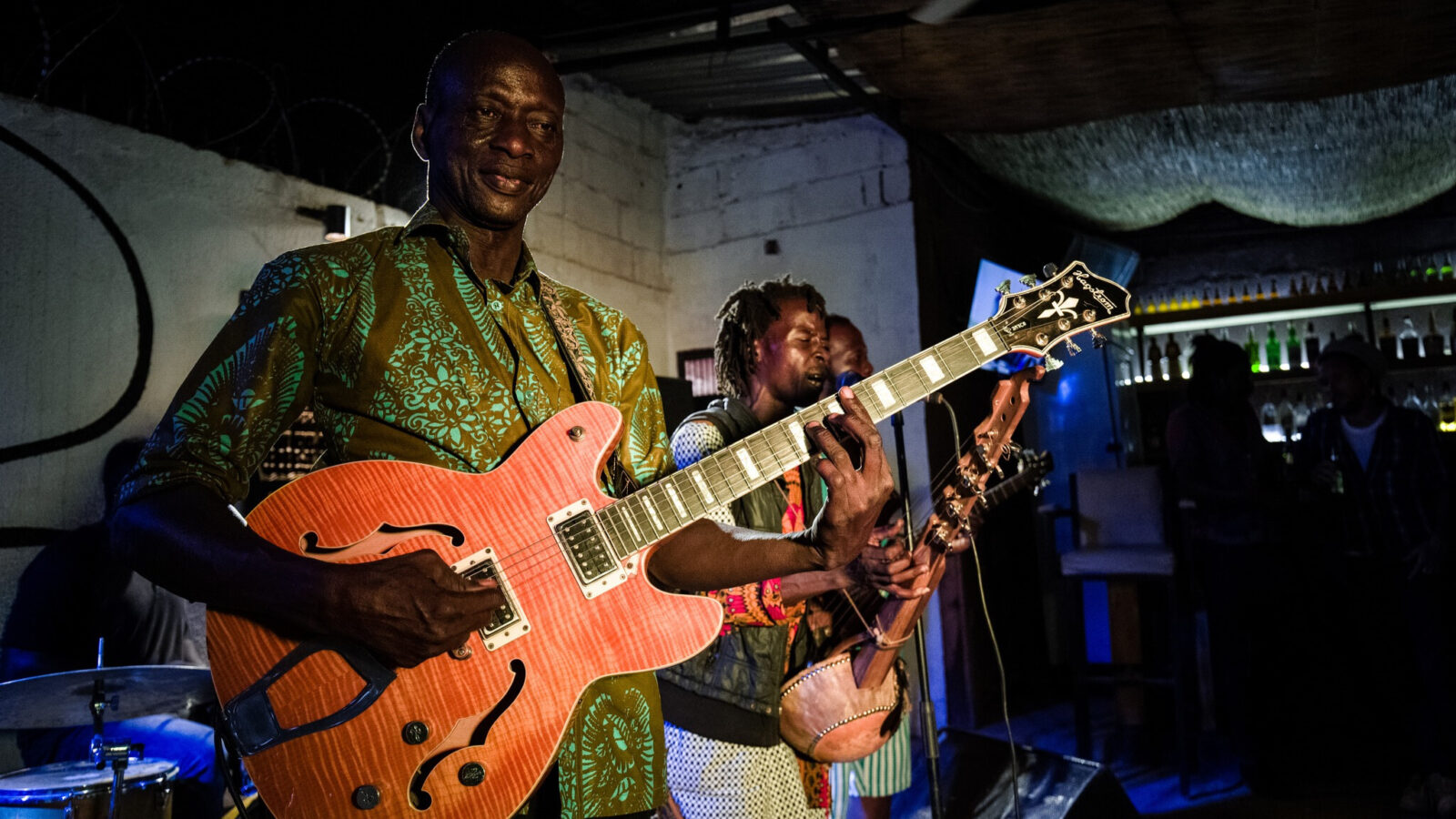There’s something beautifully electric about Baba Commandant and the Mandingo Band’s first U.S. tour. Something above the typical level of magic that the band already performs whenever they play.
Playing a fusion of traditional Mandingue music and Afrobeat styles anchored by a powerful rhythm section and the mesmerizing guitar work of Issouf Diabate, the voice of Baba Commandant (a/k/a Mamadou Sanou) has a way of commanding space and entrancing audiences abroad. And especially so in the band’s home country of Burkina Faso.
Described by their label as a “non-stop hit parade of Afrobeat bangers,” the reaction that Baba Commandant has received here in the States has already been way more intense than expected.
The band has noticed. They explain to me, through a translator, that even though they know very limited English to directly communicate with these audiences, the connection felt with them is very real. (Their tour hits SPACE on June 4).
Hisham Mayet, co-founder and co-owner of the label Sublime Frequencies and the band’s de facto tour manager, concurs.
“In short, American audiences are unhinged,” Mayet laughed as he spoke with me. He’s been working with Baba and the group for about eight years now, having released the band’s first album, Juguya, on the label back in 2015.
As a label, Sublime Frequencies specializes in archival content from around the world. Compilations assembled and released by Mayet and co-founder Alan Bishop have included everything from field recordings of Rajasthani street music and radio transmissions from Beirut to Japanese shellac 78s and old Cambodian cassettes. The label had released proper contemporary work from new artists before, including the now-legendary Syrian singer Omar Souleyman, but Baba had something different with his band.
Camille Louvel, the founder of Ouaga Jungle, a recording studio located in Burkina Faso’s capital of Ouagadougou, introduced the band and their music to Mayet. He was instantly pulled. Louvel is the one driving the van as Mayet calls me, band in tow, to discuss their debut trek across North America.
“Hearing the first demos of the first album, immediately I was drawn to the style,” Mayet told me. “It’s a really novel approach to modern Afro-rock.”
The band marks a kind of epicenter of a lot of sounds and styles in West African music, material that Mayet collects not just for ethnographic purposes, but for his own personal tastes as a listener.
“There’s a great beat—a rhythm—a groove that totally resonates with me,” he said. “You have to be at the clubs and bars in West Africa to hear this music but you don’t see anybody really trying to release it in the modern day.”
It helps that Baba Commandant and the Mandingo Band really are incredible live performers. One of the things that cemented the importance of this partnership in Hisham’s mind was the band’s tour of Europe following the release of Juguya.
“Seeing them live every night, and just seeing how good the band was every night, and what great musicians they were, really just inspired me to do more albums,” he said.
With that, the tour supporting the band’s third album, Sonbonbela, comes with the same incredible performances and the same hunger from everyone involved to make more music. It’s an electric and contagious energy that has definitely been noticed by the audiences.
Mayet told me the previous night the band had an impromptu collaboration in Cleveland with the opener, local group Mourning [A] BLKstar. The group’s psychedelic and eclectic sound melded in a mind-blowing way with Baba and his band. M[A]B’s horn section really brought the moment to life. It’s these unique collaborative artistic moments that Mayet hopes to capture throughout this tour. It’s also why the tour was booked largely in smaller rock clubs, an environment that closely mirrors the Burkina clubs the band is used to.
“They’re a rock band—an Afro-rock band—and they need to play clubs, where people are dancing, drinking, sweating. It’s not meant to be a museum gig.”
In Mayet’s eyes, the label’s primary mission statement has been to display music from around the world as “living, breathing expressions.” He lamented upon starting Sublime Frequencies the growing trend in the Western appraisal of so-called “world music” as cold and anthropological, often patronizing this art as something to be observed from a distance. Artists like Baba Commandant & the Mandingo Band remind him of the need to preserve and release international music as the living art that it is—in context.
Every night, Baba gets on stage and plays the ngoni, a traditional instrument from the West African region. Here in the U.S., you could go to a museum and look at a ngoni in person, and read a little placard that describes the cultures the instrument originated in, and that evidence of its existence traces back to the fourteenth century. You could even discover that the larger variant of the instrument that Baba plays, the donso ngoni, originated with the Donso society of hunters in the region Baba is from.
Yet if you did that, you might come to think that the instrument is a product of a past time, even an artifact. With this tour, Baba, his band, and Sublime Frequencies make an active refutation of this notion. The traditions of Baba’s culture, like the traditions of our own, exist alongside modern life, and the two fuse often together in a wonderful expression. Baba’s donso ngoni plays an integral role in several songs every night.
“In a sense, it’s almost the lead instrument,” Mayet said. This prominent display gives audiences a direct and interactive form of engagement with not only the physical instrument, but the cultures and people that have thrived alongside it.
It’s a task SPACE was tailor-made for, one that wouldn’t exactly translate in the sterile halls of a museum.
Baba Commandant and the Mandingo Band play with DJ Psychic Sounds at SPACE on Sunday, June 4 | 8 pm | $18 adv, $22 day of | Tickets here

